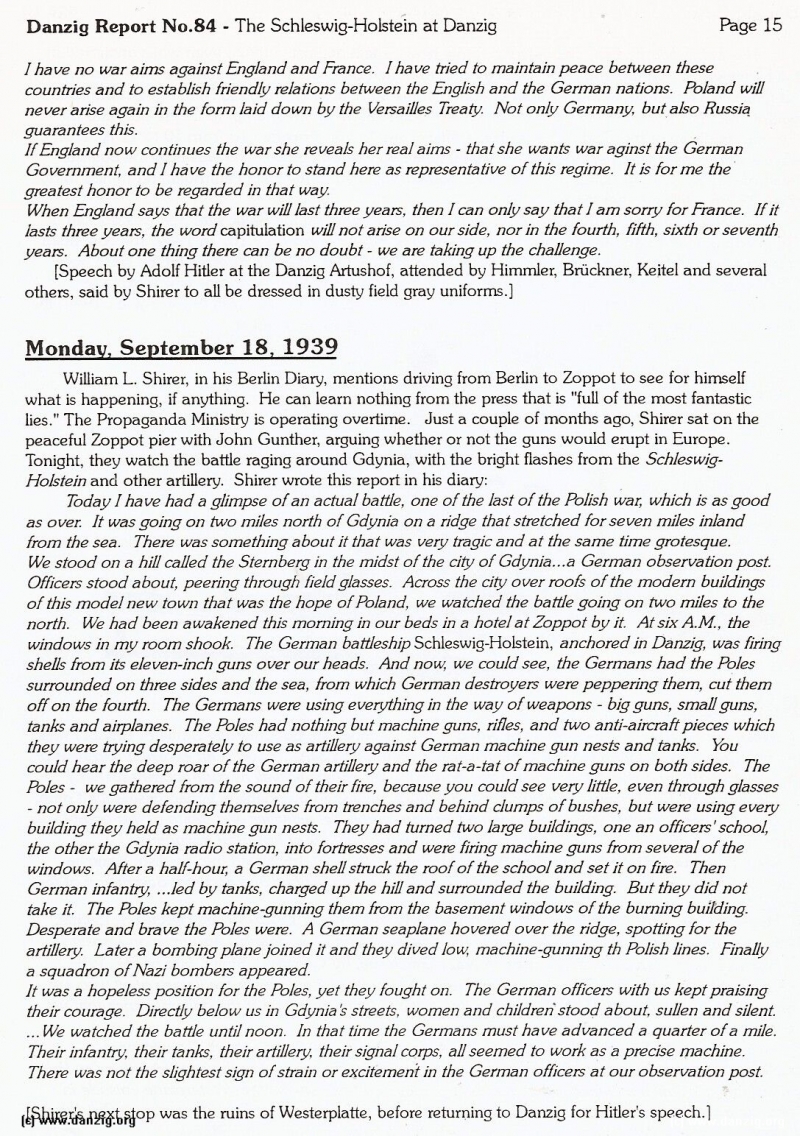
I have no war aims against England and France. I have tried to maintain peace between these countries and to establish friendly relations between the English and the German nations. Poland will never arise again in the form laid down by the Versailles Treaty. Not only Germany, but also Russia guarantees this.
If England now continues the war she reveals her real aims - that she wants war aginst the German Government, and! have the honor to stand here as representative of this regime. It is for me the greatest honor to be regarded in that way.
When England says that the war will last three years. then I can only say that Jam sorry for France. If it lasts three years. the word capitulation will not arise on our side, nor in the fourth, fifth, sixth or seventh years. About one thing there can be no doubt - we are taking up the challenge.
[Speech by Adolf Hitler at the Danzig Artushof, attended by Himmier, Bruckner, Keitel and several others, said by Shirer to all be dressed in dusty field gray uniforms.]
Monday, September 18, 1939
William L. Shirer, in his Berlin Diary, mentions driving from Berlin to Zoppot to see for himself what is happening, if anything. He can learn nothing from the press that is “full of the most fantastic lies.” The Propaganda Ministry is operating overtime. Just a couple of months ago, Shirer sat on the peaceful Zoppot pier with John Gunther, arguing whether or not the guns would erupt in Europe. Tonight, they watch the battle raging around Gdynia, with the bright flashes from the SchleswigH olstein and other artillery. Shirer wrote this report in his diary:
Today I have had a glimpse of an actual battle, one of the last of the Polish war which is as good as over It was going on two miles north of Gdynia on a ridge that stretched for seven miles inland from the sea. There was something about it that was very tragic and at the same time grotesque. We stood on a hill called the Stemberg in the midst of the city of Gdynia. . .a German observation post. Officers stood about, peering through field glasses. Across the city over roofs of the modern buildings of this model new town that was the hope of Poland, we watched the battle going on two miles to the north. We had been awakened this morning in our beds in a hotel at Zoppot by it. AtsixA.M., the windows in my room shook The German battleship Schleswig-Holstein, anchored in Danzig, was firing shells from its eleven-inch guns over our heads. And now, we could see, the Germans had the Poles surrounded on three sides and the sea, from which German destroyers were peppering them, cut them off on the fourth. The Germans were using everything in the way of weapons - big guns, small guns, tanks and airplanes. The Poles had nothing but machine guns, rifles, and two anti-aircraft pieces which they were trying desperately to use as artillery against German machine gun nests and tanks. You could hear the deep roar of the German artillery and the rat-a-tat of machine guns on both sides. The Poles - we gathered from the sound of their fire, because you could see very little, even through glasses - not only were defending themselves from trenches and behind dumps of bushes, but were using every building they held as machine gun nests. They had turned two large buildings, one an officers ‘school, the other the Gdynia radio station, into fortresses and were firing machine guns from several of the windows. After a half-hour a German shell struck the roof of the school and set it on fire. Then German infantry, . . .led by tanks, charged up the hill and surrounded the building. But they did not take it The Poles kept machine-gunning them from the basement windows of the burning building. Desperate and brave the Poles were. A German seaplane hovered over the ridge, spotting for the artillery. Later a bombing plane joined it and they dived low, machine-gunning th Polish lines, finally a squadron of Nazi bombers appeared.
It was a hopeless position for the Poles, yet they fought on. The German officers with us kept praising their courage. Directly below us in Gdynia ‘s streets, women and childrenstood about, sullen and silent. We watched the battle until noon. In that time the Germans must have advanced a quarter of a mile. Their infantry, their tanks, their artillery, their signal corps, all seemed to work as a precise machine. There was not the slightest sign of strain or excitement in the German officers at our observation post.
[Shirer’s next stop was the ruins of Westerplatte, before returning to Danzig for Hitler’s speech.]
Danzig Report Vol. 1 - Nr. 84 - July - August - Sept - 1994, Page 15.
Hits: 3412
Added: 09/07/2015
Copyright: 2025 Danzig.org

